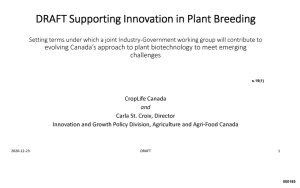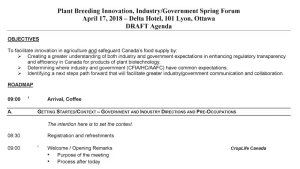Below is an unofficial translation of a second article published by Radio-Canada on the issue of corporate-government “Tiger Team – the original article in French “Tiger Team” : quand fonctionnaires et lobbyistes coopèrent dans l’ombre – please note that quotes from documents were translated from English to French and then back to English, the wording of the original documents may differ slightly.
The Canadian Government Insists it is Independent of the Agrochemical Lobby
New evidence uncovered by Radio-Canada shows that the association between lobbyists and civil servants began before the “Tiger Team” began working together and continued afterwards.
Thomas Gerbet, September 27, 2023 https://ici.radio-canada.ca/nouvelle/2013298/ministeres-canada-federal-lobbyistes-fonctionnaires-ottawa
The Canadian Food Inspection Agency and Health Canada claim that drafting of their guidelines and policies is “always independent.” The government is seeking to reassure the public after the publication of a Radio-Canada investigation showing that lobbyists from the agrochemical industry co-developed a reform on GMO plants with civil servants.
An internal government memo explained, for example, that Health Canada published its updated regulatory guidance on the basis of options developed and proposed by the Tiger Team, made up of industry and government representatives.
Emails obtained under the Access to Information Act show that lobbyists and civil servants collaborated on working documents to prepare the reform.
In a written statement sent to Radio-Canada, the Canadian Food Inspection Agency (CFIA) assured us that external parties, including industry associations, did not author  CFIA or Health Canada documents.
CFIA or Health Canada documents.
“The CFIA and Health Canada are independent, science-based, evidence-based federal regulators committed to ethical transparency and accountability.” – Response of the Canadian Food Inspection Agency
Collaboration before and after the Tiger Team’s work
The federal government confirms that the Tiger Team consisted of officials from Agriculture and Agri-Food Canada, the CFIA and Health Canada with representatives from CropLife, the Canada Grains Council and Seeds Canada. These three lobbies defend the same interests.
Half of the members of the Seeds Canada Board of Directors represent companies that are also members of CropLife. The President of CropLife, Pierre Petelle, sits on the Board of the Canada Grains Council. No other group interested in the reform, notably the opponents, was present.
Ottawa says the Tiger Team was formed to engage with associations representing regulated parties from August 2019 to mid-2020. But the documents we have obtained show that they were working hand-in-hand before that and afterwards.
“The technical working group met on May 21 [2019] to discuss a series of industry-developed proposals for the future of promoting plant breeding innovation in Canada.” – from a report of a government-industry meeting in an Ottawa hotel
Emails obtained by Radio-Canada also show that CropLife provided civil servants with material for a communications strategy in December 2020.
Active lobbying during the Tiger Team’s work
The federal Registry of Lobbyists lists 12 meetings between Tiger Team member organizations at the same time that the team was conducting its work. Seeds Canada, which was then called the Canadian Seed Association, met eight times with senior officials involved in the reform between August 2019 and May 2020. CropLife had five similar meetings.
“Important to have a common understanding,” says Ottawa
A 2018 document shows that the two parties were meeting to identify areas where industry and government had common expectations and to facilitate greater communication and collaboration.
We asked the government why it had developed definitions of key reform concepts jointly with the industry. We can see from the emails that CropLife was providing definitions, and asking officials not to mention that they had provided them.
The CFIA responded that, “[w]hen it comes to terminology, it is important to have a common understanding of the technical terms and definitions related to gene editing and novel genes. This is particularly true when it comes to new technologies.”
The Bloc Québécois calls for the reform to be re-examined
Deeming these findings unacceptable, on Tuesday, the Bloc Québécois called for the regulatory changes made under the auspices of the Tiger Team to be re-examined by a committee of truly independent experts.
“You can’t ask people who are going to make money from a product we’re going to approve to decide how we’re going to approve it, then which paragraph, then how we’re going to word the text. It just doesn’t make sense.” – Yves Perron, Agriculture critic for the Bloc Québécois
The Quebec network Vigilance OGM (GM Watch) is calling on Ottawa to cancel the regulatory update altogether.
The government insists it has taken everyone’s opinion into account
Groups opposed to the reform were shocked by Radio-Canada’s revelations. Greenpeace calls it a disgrace, while Nature Québec calls it a mind-blowing degree of closeness.
The federal government points out that it had extended its discussions and consultations from 2021 until 2023 with university researchers, non-governmental organizations and organic producers’ associations.
But those who took part in the public consultation in 2021 (fruitlessly) denounce the power imbalance, because they did not have the same access to civil servants, the same chance to express their views, and were not listened to in the same way as the lobbyists.
“The CFIA and Health Canada take into account all feedback from stakeholders during consultations. Collaboration with other stakeholders involved is essential to understand the full range of scientific considerations and perspectives.” – Response of the Canadian Food Inspection Agency






